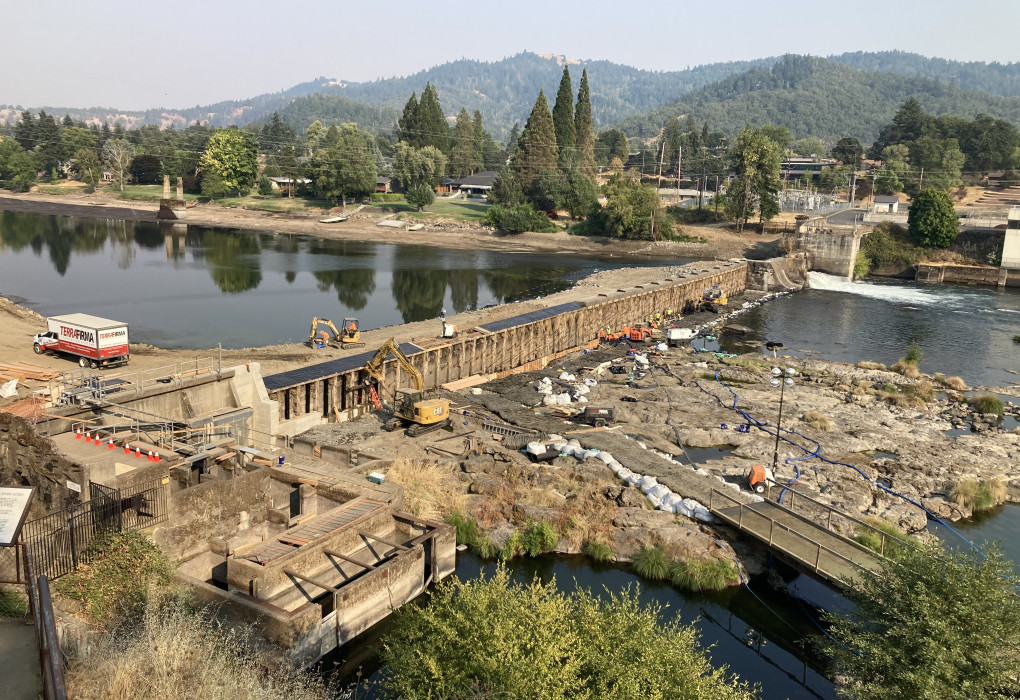Extensive Tire Mats Used in Winchester Dam Repairs Sparks Fears of Toxics-Driven Fish Kill
Over a week ago, Winchester Water Control District started repairs on their privately owned dam. A dam that is delaying and harming fish for the sole purpose of private recreation. It’s been disastrous, to say the least. Below is the most recent update on the dam concerning potential toxins as a result of the repair methods. If you are interested in how you can help, we encourage you to ask your State and Federal Representatives to stand up for the North Umpqua River by sharing your voice and submitting an Action Alert here.
FOR IMMEDIATE RELEASE
FOR MORE INFORMATION, PLEASE CONTACT:
Jim McCarthy, WaterWatch of Oregon, 541-941-9450, jim@waterwatch.org
Kirk Blaine, Native Fish Society, 307-299-7834, kirk@nativefishsociety.org
Extensive Tire Mats Use in Winchester Dam Repairs Sparks Fears of Toxics-Driven Fish Kill
6PPD-q is highly toxic to salmon and steelhead, and can kill Coho salmon within hours
Winchester, OR – Last week, river advocates notified the Oregon Department of Environmental Quality, the U.S. Army Corps of Engineers, NOAA Fisheries, and other relevant agencies that TerraFirma Foundation Systems, the contractor for the controversial Winchester Dam repair on the North Umpqua River, is using large mats made from old vehicle tires as a work surface for operating heavy machinery on temporarily dewatered river channel, in standing water, and in flowing water. River advocates fear that the rubber tire material may be shedding a toxic chemical called 6PPD-q and polluting the North Umpqua River, and is likely a violation of the state and federal clean water permits for the repair. Advocates also fear that the wear from the multi-ton, tank-tracked heavy machinery, such as excavators operating on the tire mats, is generating rubber dust and debris that may wash into the river and could shed 6PPD-q long after the repairs are completed. Among other concerns, if there is 6PPD-q pollution from the repairs, it could trigger a salmon and steelhead kill on top of the already massive kill of Pacific lamprey triggered after the dam reservoir drawdown began August 7th.
River advocates are urging regulatory agencies to address the situation quickly. Tire manufacturers have used 6PPD since the 1950s to keep tires from degrading too quickly. At the tire’s surface, 6PPD interacts with ozone to create several transformation products, including 6PPD-q. Emerging science has pointed to toxicity in mammals, indicating a potential risk to human health. Winchester Dam is 50 feet upstream of the City of Roseburg water intake, and approximately five miles upstream of the water intake for Umpqua Basin Water Association. Together, these public drinking water providers serve over 37,000 people.
The use of toxic materials would not be a new development at Winchester Dam. State records show the dam owners have previously repaired the dam by installing large numbers of toxic pressure-treated wood planks and railroad ties. The U.S. Environmental Protection Agency and U.S. Department of Human Services recommend that treated wood not be used where it may come in direct or indirect contact with public drinking water. Despite this, regulators have not required removal of any treated wood from the structure. The 2023 repair plan calls for drilling large numbers of holes into the dam’s treated wood to secure a steel lattice.
Even before the latest concern regarding the possible release of toxic pollutants, the situation had become extremely dire for the North Umpqua's native fish. Last week, river advocates warned that some of the last few summer steelhead and spring Chinook salmon left in the North Umpqua may become the next aquatic life to die because of the dam repairs, trapped in the warm water below the dam’s closed fish ladder as a heat wave scorched the region.
Winchester Dam is a derelict former hydropower facility and one of the state’s highest priorities for fish passage correction. According to the Oregon Department of Fish and Wildlife, the dam blocks or impedes access to 160 miles of high quality habitat for native fish even when the fish ladder is in operation. River advocates from a coalition of fishing, conservation, and whitewater groups have been working for years to raise alarm bells with government officials over the Winchester Water Control District’s chronic non-compliance with state and federal repair permitting, engineering, water quality, and dam safety requirements as well as their disregard for protections for fish and wildlife despite the essential habitat importance of the North Umpqua for salmon and steelhead.
River advocates are preparing to document another fish kill if it materializes and will be available to reporters for comment and to provide photos and video.
~~~~~
River Advocates Petition to ODFW
https://waterwatch.org/wp-content/uploads/2023/02/Winchester_Dam_Passage_Petition_02_26_23.pdf
Public Records/Agency Notes from Past Winchester Dam repairs:
https://waterwatch.org/wp-content/uploads/2023/08/WInchester-Draw-Down-Note-Synthesis-Final.docx
https://waterwatch.org/wp-content/uploads/2023/08/WInchester-Draw-Down-Note-Synthesis-Final.docx
Winchester Dam Repair Permits
ODFW Fish Passage Authorization:
DEQ 401 permit:
https://waterwatch.org/wp-content/uploads/2023/08/20230718_DEQ_401_WQC_2018_505_1.pdf
NOAA Biological Opinion:
https://waterwatch.org/wp-content/uploads/2023/08/2023_07-20_WinchesterDam_WCRO-2022-02717.pdf
Army Corps permit:
https://waterwatch.org/wp-content/uploads/2023/08/20230726-NWP-Verification-Ltr-NWP-2018-505-1.pdf
Revised WWCD removal-fill application (last one before Corps and DEQ issued permits):

